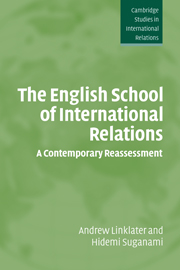Book contents
- Frontmatter
- Contents
- Acknowledgements
- Introduction
- 1 The idea of ‘the English School’ as a historical construct
- 2 The argument of the English School
- 3 The English School on ‘International Relations as an intellectual pursuit’
- 4 Progress and its limits: system, society and community in world politics
- 5 Cosmopolitanism and the harm principle in world politics
- 6 The sociology of states-systems
- 7 The good international citizen and the transformation of international society
- Conclusion
- Bibliography
- Index
- CAMBRIDGE STUDIES IN INTERNATIONAL RELATIONS
6 - The sociology of states-systems
Published online by Cambridge University Press: 22 September 2009
- Frontmatter
- Contents
- Acknowledgements
- Introduction
- 1 The idea of ‘the English School’ as a historical construct
- 2 The argument of the English School
- 3 The English School on ‘International Relations as an intellectual pursuit’
- 4 Progress and its limits: system, society and community in world politics
- 5 Cosmopolitanism and the harm principle in world politics
- 6 The sociology of states-systems
- 7 The good international citizen and the transformation of international society
- Conclusion
- Bibliography
- Index
- CAMBRIDGE STUDIES IN INTERNATIONAL RELATIONS
Summary
In the 1960s Martin Wight and his colleagues in the British Committee on the Theory of International Politics wrote several papers on the ‘historic states-systems’ of Ancient Greece, China in the Spring and Autumn, and Warring States period, and the modern world. A volume on the sociology of states-systems was planned – a successor to Butterfield and Wight's Diplomatic Investigations – but the project did not come to fruition (Dunne, 1998: 124ff). Wight's papers on the sociology of states-systems were published posthumously in 1977. Fifteen years later Watson (1992) produced a world-historical analysis of different types of international system which remains the most comprehensive overarching sociological statement by a member of the British Committee. Recent publications indicate that interest in this realm of its intellectual endeavour is much greater than at any other time in the recent past; they also reveal that the influence of Watson and Wight's publications is evident in works by writers who have not usually been associated with the English School (Buzan and Little, 2000; Linklater, 2002b). Of the many reasons for current efforts to resume the work of the British Committee one of the most important is the desire to build on the ‘sociology of states-systems’ which some of its members initiated nearly four decades ago.
The revival of interest in this area is part of a larger intellectual movement in which many students of international relations have become interested in developing large-scale historical-sociological accounts of world politics (Little, 1994).
- Type
- Chapter
- Information
- The English School of International RelationsA Contemporary Reassessment, pp. 189 - 222Publisher: Cambridge University PressPrint publication year: 2006

